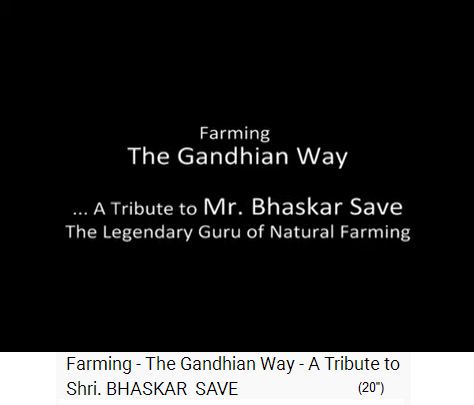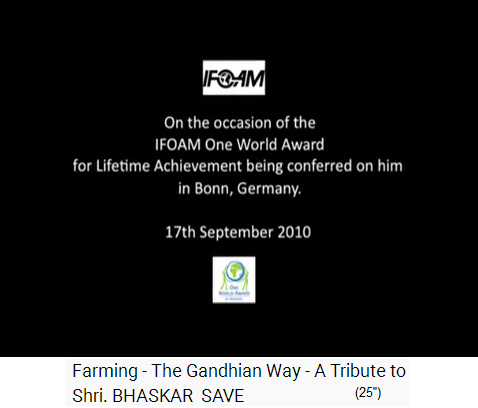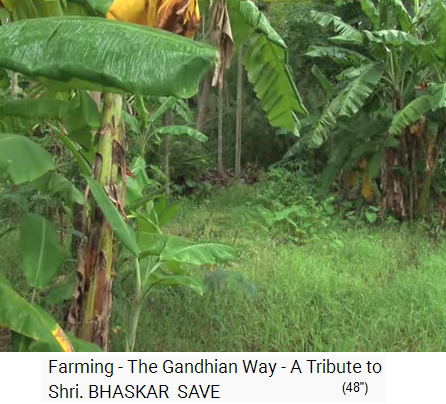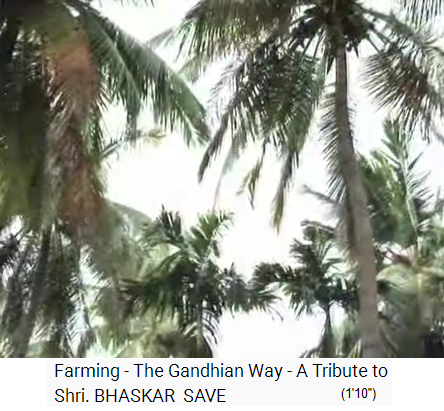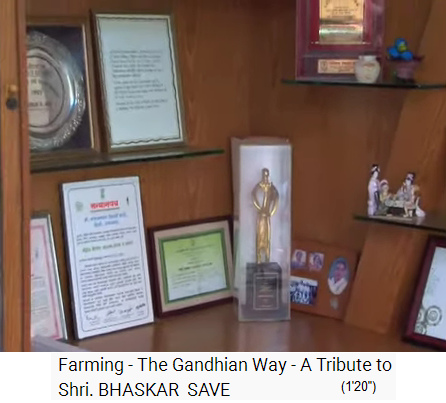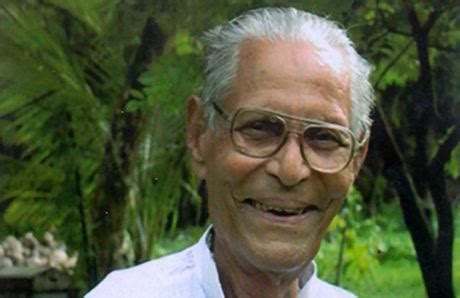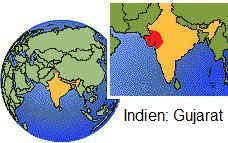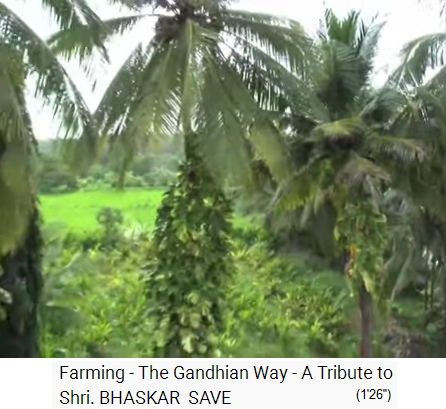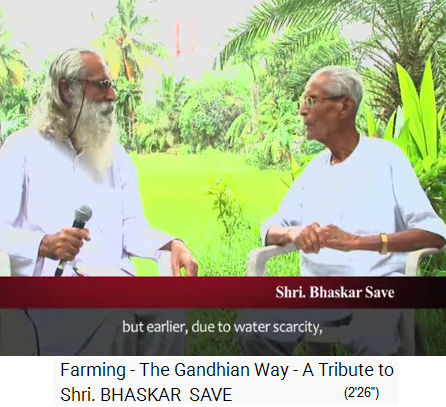Permaculture pioneers are working organic agriculture
being called permaculture - working almost without any
machinery, no pesticides, almost no irrigation.
|
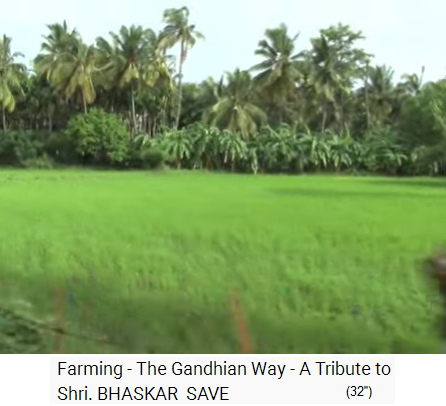
Organic farm of Bhaskar Save: field with palm
forest around it [movie1-03]
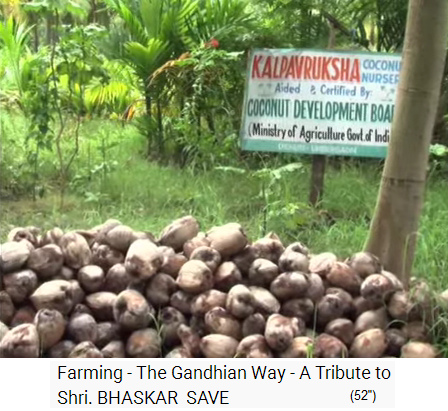
Coconut harvest with Bhaskar Save with the shield
"Klapavruksha" [movie1-06]

Bhaskar Save in sandals [movie1-07]

Fukuoka visiting Bhaskar Save 1997 in Gujarat
[movie1-11]
|
|
The permaculture pioneer Bhaskar Hiraji
Save (1922-2015)
-- the Save family maintains a 6 hectare orchard in the
Umbergaon region in the state of Gujarat near the coast of
the Arabian Sea
-- was also known as the "Gandhi of organic farming" in
India, gave courses and was an activist [web01].
-- born in the coastal village of Dehri in the Valsad
district on the Arabian Sea, the family belonged to the
agricultural Wadval community, electricity was still
unknown
-- Save mainly saw the cultivation of rice, pulses and
vegetables, neighborly help with the rice harvest was
normal
-- The Warli tribe made an impression with the assertion
that "God" lives in green trees, there you were only
allowed to fell trees when they had dried out, this tree
culture was absent in his coastal village
-- first he was a teacher, and from 1952 a well was built
on his farm and fertilizers and pesticides were used, then
he was lured into the fertilizer sale (at the Gujarat
State Fertilizer Corporation), Save became the model for
the use of fertilizers, was able to acquire a piece of
land, the basis of the later Kalpavruksha farm
-- but now there were writings from Gandhi and Vinoba
Bhave about healthy agriculture and in 1956 Save returned
to the traditional cultivation methods of his father AND
decided to experiment in rice cultivation with an organic
system, where the water of the plots was changed during
the monsoon rains without pesticides to use it - and it
was successful - its income decreased in the first year,
but so did expenses
-- Save now carried out further experiments for organic
agriculture: crop rotations, the use of the moist soil
after the monsoon with winter legumes, which in turn
enrich the soil with nitrogen, and cattle grazed the
harvested fields on which the plant residues were
-- from 1957 Bhaskar Save had his own farm with a house,
he got rid of chemicals completely by 1960 and planned his
orchard
-- Altogether Bhaskar Save developed his own system of
organic agriculture in this way and saw the truth about
fertilizer and monoculture, which only brings
impoverishment
-- Save worked with trees and with active irrigation of
tree cultures, supplemented by grain, vegetables and
cattle, he is considered a pioneer of the platform and
ditch system to keep his soil moist all year round
-- The goal of Save was to keep the soil covered and
combined short-lived, medium-lived and long-lived plant
species (polyculture) to optimize the yield and to let the
trees grow as quickly as possible - this is how Save
created the polyculture categories [web01].
-- Save combined:
-- Ephemeral plants, which refer to annual
vegetables, grains, herbs, and annual flowers.
-- Medium-life edible plants, including flowers,
cereals, grasses and fruit trees.
-- Long-lived plants, which are perennial vegetables,
such as rhubarb, horseradish, asparagus; perennial
herbs, some allies (leeks, chives, garlic), some members
of the Brassica family (cabbage and kale); and
blackberry fruits (raspberry, blueberry and blackberry),
nut trees (hazelnut, chestnut, almond or pecan), fruit
trees (kalpavriksha, chikoo and coconut) and some
grasses like alfalfa [web01].
-- Another goal of Save was to grow trees in low-lying
rice fields
-- Save also wanted to raise the land, built earth
terraces (berms) between the rice fields, a pond was dug
and the excavated earth was used for the earth terraces,
more every year
-- Seedlings were grown on the earth terraces: coconut,
chikoo (long-lived), combined with vegetables
(short-lived), later combined with bananas and papaya
(medium-lived for shadows) [web01].
[In this way his coconut rice farm was growing].
-- from 1993, Bhaskar Save received heaps of awards for
his organic farming system [but the corrupt governments
hardly took any notice]
-- In 1997 Masanobu Fukuoka from Japan came to visit
Kalkpavruksh Farm for the 50th Independence Day under
Gandhi [Fukuoka hat also developed a permaculture
principle on the base of rice -
link]
-- In 2006 Bhaskar Save wrote an open letter to the
Minister of Agriculture and other senior officials on how
the rising suicide rate and debt of farmers could be
eliminated: No more pesticides and fertilizers!
-- 90% of the family income comes from Chikoo and coconut
[web01].
Contact web site with the precise address:
http://www.savesanghavi.com/contact.html
Video
Text commenting the video: Bhaskar won a prize in 2010
in Bonn [but governments never took earnest Bhaskar's
work]
<Observer Research Foundation in association with South
Gujarat Progressive Farmers Self Reliant Producer Company
Ltd, presents 'Farming - The Gandhian Way'- A tribute to
the Legendary Bhaskar Save on the occasion of IFOAM One
World Lifetime Achievement Award bieng conferred onto him
in Bonn, Germany on 17th September 2010.> [web02]
